The festive season is almost upon us. With Durga Puja and Diwali around the corner, many of us have already started to make plans for vacation. After a seemingly endless cycle of lock-downs, quarantines, and travel restrictions, the traveler and explorer inside us want to break free and get away.
But, the constant news of COVID and the mob of tourists thronging popular holiday destinations might force you to have a second thought. Right? Well, it is certainly possible to simultaneously travel and keep your family and yourself safe if you follow a few basic precautions and guidelines.
So, here we have listed a set of tips to help you plan your next vacation:
Table of Contents
1. Getting vaccinated for safe travel and carry its proof
Vaccination against COVID-19 is the best way to remain safe during travel.
Vaccines against COVID-19 have been scientifically proved to be highly effective in preventing the transmission of COVID-19. They reduce the chance of catching the disease, spreading the virus and especially effective in preventing severe illness and fatality. The safety profile of the vaccines has also been established by now. We suggest postponing your vacation until every one in your family has been fully vaccinated. For children who are still not in the vaccination age group, you may consider following the general safe practices listed below and follow the safety guidelines for unvaccinated people. Check this article for further information.

Photo by Marisol Benitez on Unsplash
In India, vaccines are available free of cost from Government vaccination centers and in certain Private hospitals against a fee. You can book your appointment for vaccination here
Do not forget to carry the proof of your vaccination with you. Ar present, most of the tourist places and even hotels are checking vaccination certificate before allowing entry.
2. Maintain hand hygiene
It has been proven that, proper hand hygiene is the best and most cost-effective way to prevent the transmission of COVID-19. . As you take the vehicle to the airport, or grab that handrail, not to mention as you go to a popular tourist destination, you will be touching numerous surfaces along your way. This can lead to an increase in exposure risk.
You should wash your hands with soap and water for at least 20 seconds or use a hand sanitizer with at least 60% alcohol to clean hands BEFORE and AFTER:
- Touching your eyes, nose, or mouth
- Touching your mask
- Entering and leaving a public place
- Touching an item or surface that other people may have touched frequently

Courtesy WHO
While washing hands is undoubtedly the best method, it may not be possible to have access to water on the go. So, it is advisable to keep your hand sanitizer at hand always.
Additionally, make sure your sanitizer is up to the standard set by ICMR or CDC. CDC recommends sanitizers should contain at least 60 % alcohol.
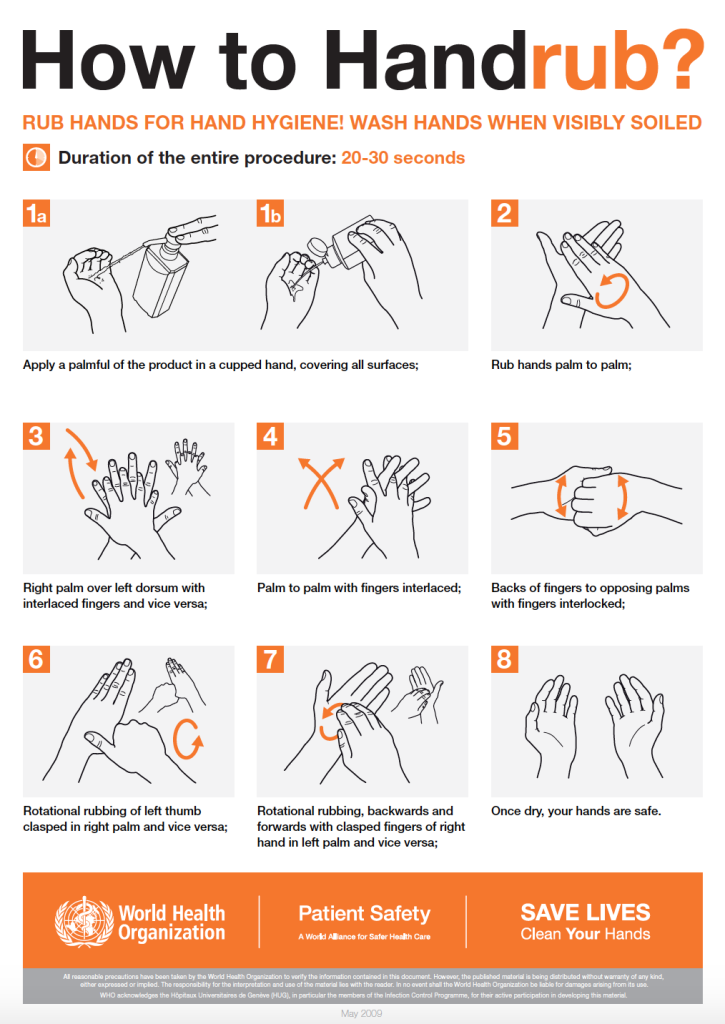
Courtesy -WHO
It is better to make a habit of practicing hand hygiene at a regular interval, as we often touch an object or surface unknowingly.
3. Mask up for safe travel
Face masks limit the spread of infectious respiratory droplets into the environment. Thus it provide both personal protection as well as prevent community spread. By this time, all of us have understood the importance of covering our face and nose in order to protect ourselves. In fact, masks have become a part of our daily attire. However, unfortunately, as the pandemic has shown signs of ebbing, a section of the population has tended to become complacent. Tourists have been seen flocking crowded places either without wearing masks or not wearing them properly. Such habits are deadly.
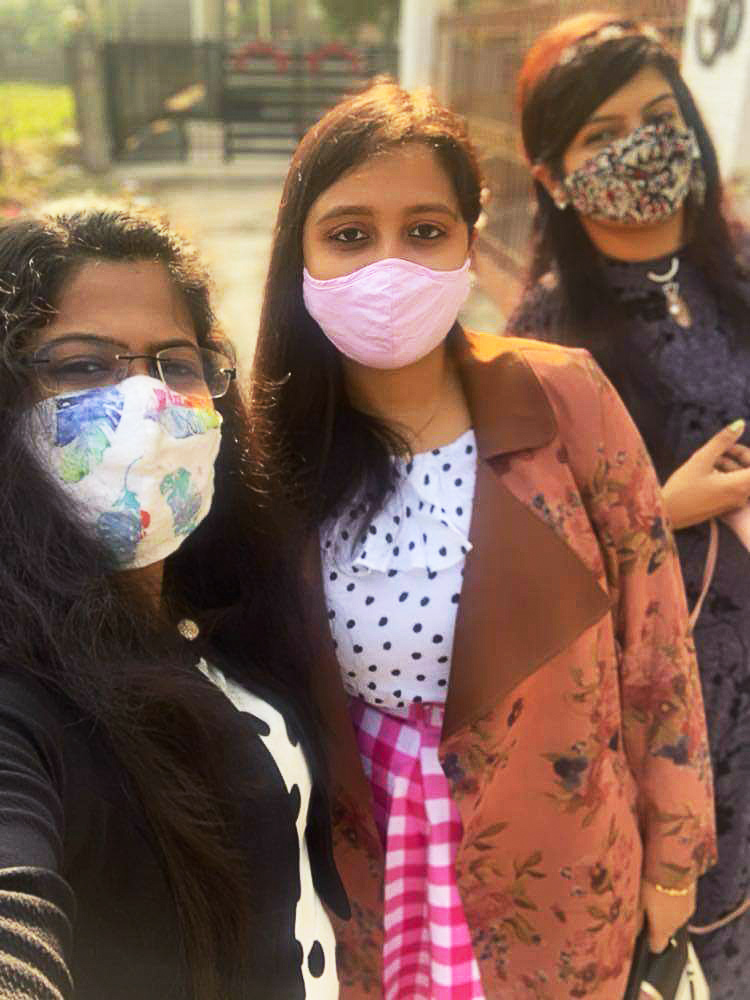
Face masks are most valuable in scenarios where physical distancing is not possible. The World Health Organization (WHO) recommends cloth masks for general public use. Cotton blend or other hybrid materials, such as cotton silk or cotton chiffon, are better as these than pure cotton masks as they have a higher filtration rate.
Wearing masks in a proper way is equally important as wearing one. Wearing mask on the chin or below the nose is a common spectacle in public places. In fact, it has been found in a recent survey that only 44% of Indian population wear masks properly.
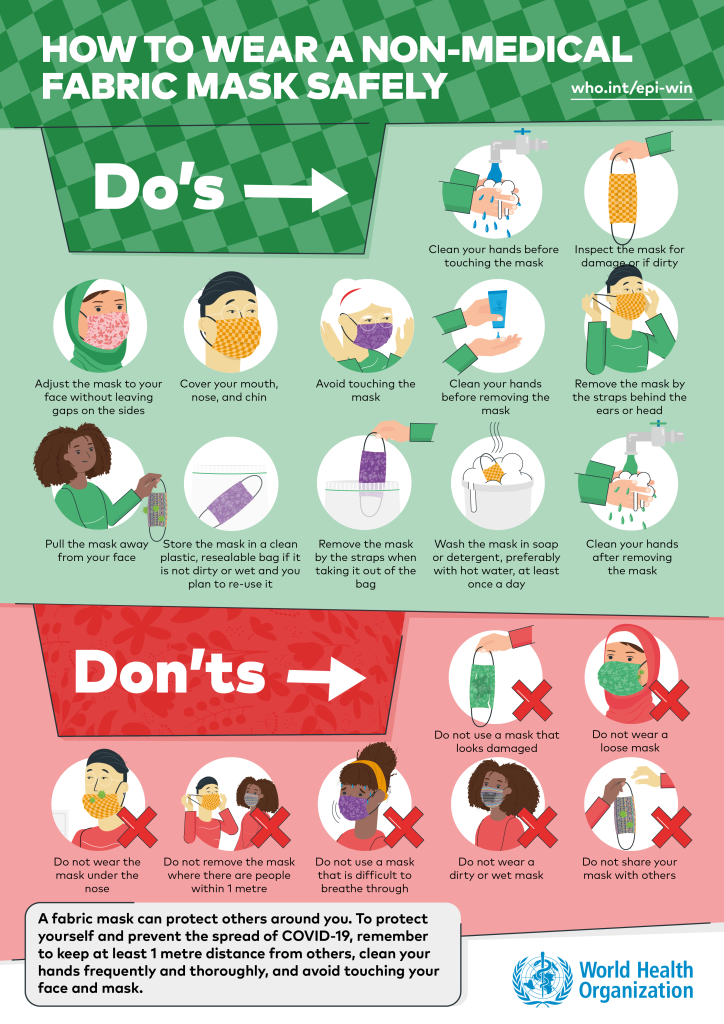
Courtesy- WHO
4. Choose your destination wisely for safe travel
For your next vacation, try to look beyond the so-called ‘touristy’ destinations. There are lots of unseen, incredible places to explore all over India, which can be your perfect vacation. Also, you don’t need to worry about facing a crowd in such places. To find some travel inspiration and guide to offbeat destinations, check out our articles on Sikkim, Jibhi, and Manipur.

Alternately, you can also plan a trip to national parks or wildlife sanctuaries. Most of them are allowing tourists. However, limited number of visitors are permitted to enter. As such, they are the perfect family destinations providing opportunities to get to know the diverse flora and fauna of India in a safe manner.

Do not forget to check out the number of COVID cases and the vaccination rates at your preferred destination. Also, follow the state guidelines.
For the more adventurous lot out there, this is a good time to go for outdoor activities. Make plans for activities that have a lower risk of COVID transmission. Maybe go on that trekking trip you have been longing for months (or years!)? Or, plan a camping trip with your fellow adventurer? These activities like trekking, hiking, or camping carry a low risk of COVID transmission and are worth exploring.
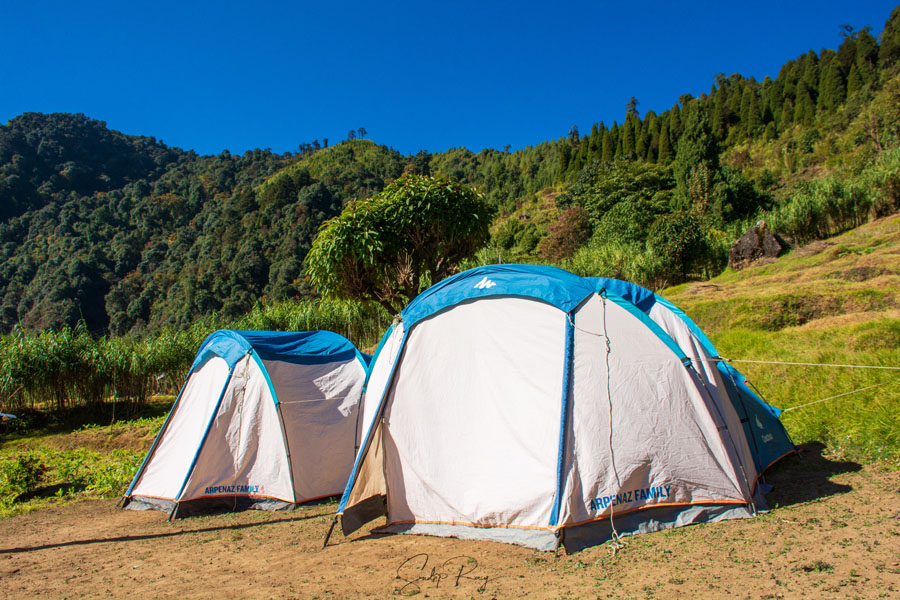
Wherever you go make a conscious effort to stay away from the crowds and try sticking to wide-open spaces. It is a good idea to visit the attractions early in the morning before they get packed with tourists.
5. Get a Travel Insurance for further protection
Travel insurance is a very important safety net. It provides much-needed peace of mind by offering you protection in a worst-case scenario. It was always an important component of travel before. But in this pandemic situation, it has assumed greater importance. In fact, it is mandatory for international travel in most cases.
Travel insurance can be of two types: domestic and international.
- Domestic Travel Insurance policy covers all the risks involved within the limits of the domestic country. The policyholder gets reimbursement during health emergencies according to the coverage agreed. Having a comprehensive travel insurance policy can make your journey breezy.
- In International Travel Insurance, the policyholder gets coverage on medical expenditures including hospitalization in the country he/she is travelling to. This is especially important because seeking medical attention in a foreign country without insurance coverage can be a nightmare. The medical bills will burn a hole in your pocket. Moreover, it will be nearly impossible to get hospitalized, if you don’t have an insurance beforehand.
They also offer you some added benefits like protection against loss of baggage, loss of credit/debit cards, flight cancellation/delay, theft, etc depending on the insurance.

Photo by Scott Graham on Unsplash
You may have to pay a higher premium for the insurance during this pandemic situation. But the benefit and peace of mind they offer justifies the cost.
While buying travel insurance, don’t forget to read in between the lines. For example, some insurances cover the cost of hospitalization but not quarantine or isolation. Knowing these finer points will spare you some rude shock!
6. Tips for accommodation for safe travel
You can choose regular hotel rooms for accommodation. However, keep the following things in mind for safe travel:
- Avoid shared accommodation and places with common bathrooms(for example, dormitory style hostel) as much as possible. Consider choosing private accommodation.
- If you do have to share your room with fellow travelers inquire about their vaccination status. If they are unvaccinated, consider using masks indoors also.
- Inquire the hotel authority about their cleaning and disinfection protocols.
- Though the risk of contracting COVID -19 from surfaces is minimal, it is a smart move to do a basic cleaning of the most touched surfaces like doorknobs, light switches, TV remote ,etc with alcohol wipes when you first arrive and after housekeeping. Also, you can carry your own bed-sheets and pillow covers just in case.
- Try to keep your windows open for better ventilation. Re-circulation of air drastically reduces the quantity of lingering aerosols.

7. Tips for safer eating habits
- It is safer to carry your own food and drinks. For example, if you are on a road trip or say, a day trip, you can always bring your lunch packed from home instead of visiting a restaurant. Or if you are in a hotel, request the hotel to pack your food.
- If you are in a mood to explore the local cuisine, you may select a restaurant, which offers outdoor seating facility where social distancing is possible and servers and other staff wear masks.
- Eating inside a restaurant is also safe, provided the space is well ventilated, social distancing is maintained, servers and other restaurant staff wear masks properly and proper cleaning protocols are being followed.
- Avoid eating inside restaurants that are poorly ventilated, where social distancing is not maintained, servers and staff do not wear masks properly.
- It is better to avoid self-service options that require extensive touching of surfaces, such as buffets.

Photo by Caleb Wright on Unsplash
7. Tips for transportation for safe travel
The pandemic has resulted in the growing popularity of short trips and day trips. Following are little tips for getting you and your family to your destination safely.
During car travel –
- Try to travel with your family or fully vaccinated people.
- Make fewer stops for safe travel
- While making stops try to avoid crowds and unnecessary interactions.
- It is a good idea to clean your vents and coolants regularly to prevent accumulation of germs
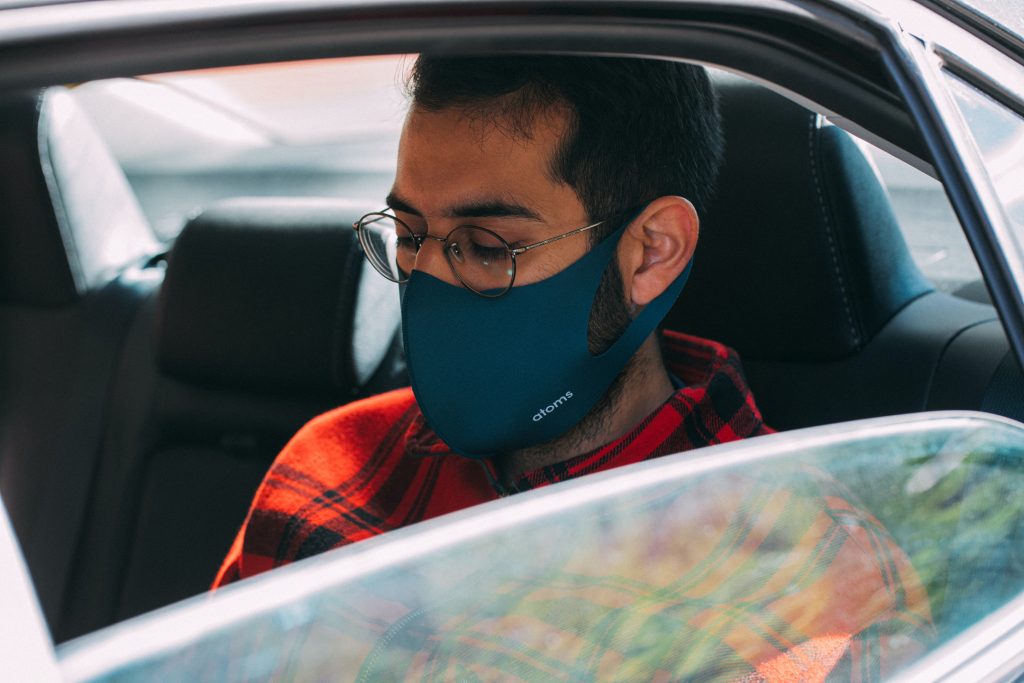
Photo by Charles Deluvio on Unsplash
During Air travel-
- Air travel is generally considered safe with risk of transmission low in flights. Airplanes are equipped with HEPA filters which filter out 99% of germs. They also follow strict disinfection protocols . Still certain habits like keeping your masks and face shields on during entire flight time, avoiding unnecessary interactions during flight, keeping seated in your place and doing a quick swipe of surrounding surfaces with alcohol wipes are good ideas.
- Airports are however the places in which you need to be extra cautious . Try to take a direct flight whenever possible and keep visits to airports minimum. While in the airport avoid crowds, touching surfaces and try to refrain from that tempting visit to the cafeteria! Get your boarding ticket printed beforehand ,this will save you a long and unnecessary wait in the queue .
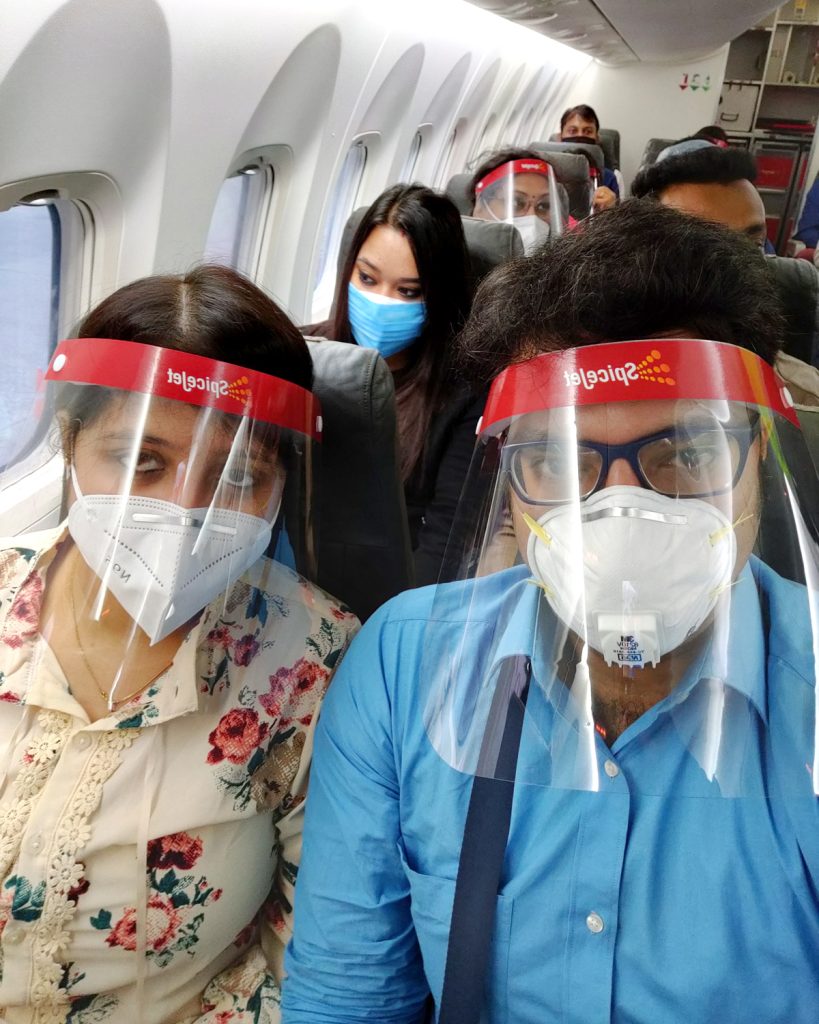
During public transportation–
- Try to keep the use of public transportation to the minimum. A long journey in a bus or train is bound to increase the risk of exposure. Always consider a private vehicle whenever possible
- If unavoidable, maintain the universal safety precautions including masks, hand hygiene and social distancing as much as possible.

Photo by Dennis Siqueira on Unsplash
8. Stay up-to-date for safe travel
As they rightly say, preparation is the key. The core essence of a successful, enjoyable trip lies in thorough planning.
Before you start planning your trip, check out the travel guidelines issued by your government as also the guidelines issued by the local authority of the place which you intend to visit. Remember, these can change in a short period of time. So don’t forget to keep yourself updated.
Check for the documents related to COVID-19 required. Some areas require a full vaccination certificate, some areas require a negative RTPCR report and some areas require mandatory quarantine. These vary from region to region, so do check beforehand.
Depending on where you’re returning from, your government may require you to quarantine on arrival – may even be at a state-run accommodation facility, and maybe at your own expense.
So, if you want to avoid the hassle and expense of quarantine, you should consider traveling domestically instead of overseas for now.
9. Have a good time
Now comes the most important part.
You have made all the preparations, did all your research thoroughly and booked the safest flight, safest hotel, and arranged for the safest transport.
Now it is time to relax, leave the worry and give yourself permission to enjoy the travel.
After all this stress of the pandemic year, you and your family fully deserve a vacation. Go out, relax, enjoy and stay safe!

Certain useful links
For COVID related information –
https://www.cdc.gov/coronavirus/2019-ncov/index.html
https://www.who.int/emergencies/diseases/novel-coronavirus-2019
For travel advisory and guidelines-
https://www.dgca.gov.in/digigov-portal/jsp/dgca/homePage/covid19.jsp
For travel ideas and links to state tourism sites-
https://incredibleindia.org/content/incredible-india-v2/en.html
